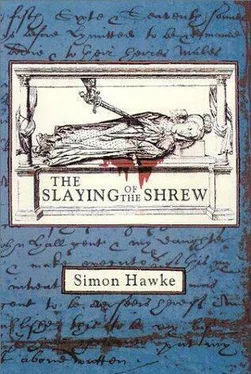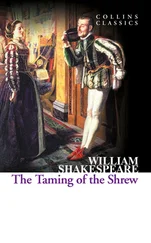Simon Hawke - The Slaying Of The Shrew
Здесь есть возможность читать онлайн «Simon Hawke - The Slaying Of The Shrew» весь текст электронной книги совершенно бесплатно (целиком полную версию без сокращений). В некоторых случаях можно слушать аудио, скачать через торрент в формате fb2 и присутствует краткое содержание. Жанр: Исторический детектив, на английском языке. Описание произведения, (предисловие) а так же отзывы посетителей доступны на портале библиотеки ЛибКат.
- Название:The Slaying Of The Shrew
- Автор:
- Жанр:
- Год:неизвестен
- ISBN:нет данных
- Рейтинг книги:5 / 5. Голосов: 1
-
Избранное:Добавить в избранное
- Отзывы:
-
Ваша оценка:
- 100
- 1
- 2
- 3
- 4
- 5
The Slaying Of The Shrew: краткое содержание, описание и аннотация
Предлагаем к чтению аннотацию, описание, краткое содержание или предисловие (зависит от того, что написал сам автор книги «The Slaying Of The Shrew»). Если вы не нашли необходимую информацию о книге — напишите в комментариях, мы постараемся отыскать её.
The Slaying Of The Shrew — читать онлайн бесплатно полную книгу (весь текст) целиком
Ниже представлен текст книги, разбитый по страницам. Система сохранения места последней прочитанной страницы, позволяет с удобством читать онлайн бесплатно книгу «The Slaying Of The Shrew», без необходимости каждый раз заново искать на чём Вы остановились. Поставьте закладку, и сможете в любой момент перейти на страницу, на которой закончили чтение.
Интервал:
Закладка:
“Enough!” said Middleton. “You go too far! This is what comes of too much tolerance and too soft a hand with children! You have said quite enough, Elizabeth! Had you been born a man, so help me, I would seek my satisfaction, but as you are a woman, I will leave you to your father. Let him decide what is to be done with you. Henceforth, you are no longer welcome in my house. You may stay the night, until your father comes for you in the morning, but I shall suffer neither your impertinence nor your presence any longer. Now get out of my sight!”
“Tuck,” she said, trying hard to keep her voice from breaking, “would you be so kind as to escort me?”
“Of course,” said Smythe. He glanced at Shakespeare. “Will?”
Shakespeare nodded and started to walk out with them.
“Get out, all of you!” shouted Middleton to the others. “Jackals! Get out and let my poor daughter rest in peace!”
Elizabeth walked quickly with her head held high and Smythe hurried to catch up with her. Shakespeare paused to take a torch from one of the servants, then trotted after them. They quickly outdistanced all the others, who slowly made their way back up the path.
“ Elizabeth…” Smythe said.
“I am all right,” she replied, although her voice was strained. “I am more afraid for John. What shall they do to him?”
“I do not think they shall do anything, for the present,” Smythe replied. “Middleton will likely have him locked up somewhere, until he can be delivered to the authorities in London.”
“I would agree,” said Shakespeare. “ ‘Tis likely that he shall turn him over to Sir William, since he is his servant, and let Sir William make proper dispensation of his fate.”
“But John is innocent!” Elizabeth said. “You know he did not do it, Tuck.”
“In truth, Elizabeth, I do not know it for a certainty. And he did admit the dagger was his own. How else should it have gotten there?”
“Because he left it there for her! He was concerned that she might be defenseless in the tomb and so we arranged to leave it hidden there for her in case she should awake and feel frightened, or in the event that robbers should come to steal her jewelry.”
“Then why did he not say so?” Shakespeare asked.
“Because he no longer cares what may become of him!” Elizabeth replied. “He loved Catherine with all his heart! He hated the whole idea of this plan, despised it and said ‘twas much too dangerous. He wanted simply to run away with her, instead. And now he blames himself. You saw him! A part of him died along with her! But you know he did not do this, Tuck! You were there with us!”
“Aye, for a time,” said Smythe. “Because I had followed you, I know when you met him at the vault, but I cannot say when he got there. ‘Tis possible that he had come there earlier, which means that he could have found Catherine when she awoke, and then slain her for some reason that we do not know.”
“You cannot believe that, surely!”
“ Elizabeth, I do not know John Mason. I have never before laid eyes on him until this night. But while I admit ‘tis possible he may have killed her, I do not believe he did.”
“What reasons have you for thinking so?” asked Shakespeare.
“Several,” Smythe replied. “For one thing, I am inclined to believe Elizabeth. While I did not have much speech with Mason, he struck me as a decent sort. I do not think he is a killer. And I have no doubt that he loved Catherine.”
“ ‘Twould not be the first time a love had led to murder,” Shakespeare said.
“Perhaps not,” said Smythe, “but there would have to be some reason for it and there is none here that I can see. The whole plan was designed so that Catherine and he could safely go away together and never be pursued. If his love were so intense and feverish that he might have gone mad if she were to change her mind at the last moment, then I suppose ‘tis possible he might have killed her. Yet, if Catherine were to change her mind, for whatever reason, the time to do so would have been before she took the potion. Otherwise, why take the risk?”
“Why, indeed?” said Shakespeare. “Your reasoning is sound. Well done. And I agree completely.”
“And there is one more thing that makes me doubt his guilt,” said Smythe.
“And what is that?”
“The fact that someone tried to kill me tonight while I was following Elizabeth to the vault.”
“What?” Elizabeth exclaimed. “And you never said a thing about it!”
“ ‘Twas not the time, I thought. And I wanted to see what would occur between you two.”
“What do you mean someone tried to kill you?” Shakespeare asked, with concern. “How?”
“With a crossbow,” Smythe replied. “And whoever shot that bolt damn near put it through my eye.”
“Good Lord!” said Shakespeare.
“Nearly killed!” Elizabeth exclaimed. “And you said nothing!” “There seemed no reason to say anything about it then. I had thought he saw an opportunity to strike and followed me out from the house, for I heard someone running back toward it after the bolt was shot. Now, however, it occurs to me that whoever shot at me may have been coming back to the house from the tomb, instead.”
“Then would I have not seen him on the path?” Elizabeth asked.
“Not if he heard you coming and hid until you had passed.”
“I do not understand,” Elizabeth said. “Why would someone wish to kill you?”
“Because I had overheard their plot,” said Smythe.
“What plot? What on Earth are you talking about?”
“ Elizabeth, do you remember when I told you that ‘twas I who shouted out to warn you there were others present in the maze that night? There were two men… unfortunately, I never saw them, for there was a hedge between us, but I had overheard them plotting. One of them said to the other that with Catherine out of the way, he would be free to make his move. The plot, it seems, was to impersonate a nobleman and his son, then seek to secure Middle-ton’s consent for Blanche’s hand in marriage. The prize would be Blanche, herself, and of course, her dowry, which would likely be considerable, especially if Middleton believed that he were dealing with a nobelman. I heard no further, for I had made some noise and gave myself away, whereupon they tried to run me through with their rapiers right through the hedge.”
Elizabeth gave a gasp and stopped, staring at him with alarm. “Then twice someone has tried to kill you!”
Smythe took her arm and moved her along, not wishing any of the others to catch up and overhear them. “True, they have tried twice, and they may yet try thrice if I cannot unmask them. But… here is my point. I know they were in the maze that night. And now I also know they must have seen me, for they now know who I am, which puts me at a considerable disadvantage. What if they had also overheard what you discussed with Mason? Then they would have known about the plan you made with Catherine. And they would have known that Catherine was not truly dead.”
“But if everyone believed that she were dead, and she was going away with John, then what purpose would be served in killing her?” Elizabeth asked.
“To divert attention and suspicion from themselves,” said Shakespeare.
“Precisely,” Smythe agreed. “We are clearly dealing with coldblooded men who shall stop at nothing to achieve their ends.”
“You must tell Godfrey Middleton about this!”
“He already knows, Elizabeth. As does Sir William. We have told them both about it and have their charge to do anything we can to help get to the bottom of it.”
“He knows about it?” she replied, with amazement. “Then why in God’s name does he blame John?”
Читать дальшеИнтервал:
Закладка:
Похожие книги на «The Slaying Of The Shrew»
Представляем Вашему вниманию похожие книги на «The Slaying Of The Shrew» списком для выбора. Мы отобрали схожую по названию и смыслу литературу в надежде предоставить читателям больше вариантов отыскать новые, интересные, ещё непрочитанные произведения.
Обсуждение, отзывы о книге «The Slaying Of The Shrew» и просто собственные мнения читателей. Оставьте ваши комментарии, напишите, что Вы думаете о произведении, его смысле или главных героях. Укажите что конкретно понравилось, а что нет, и почему Вы так считаете.












